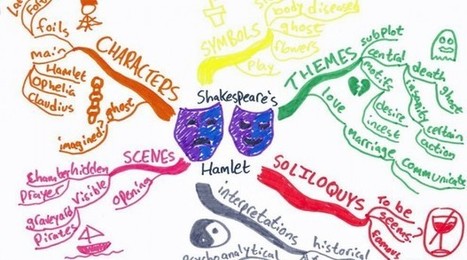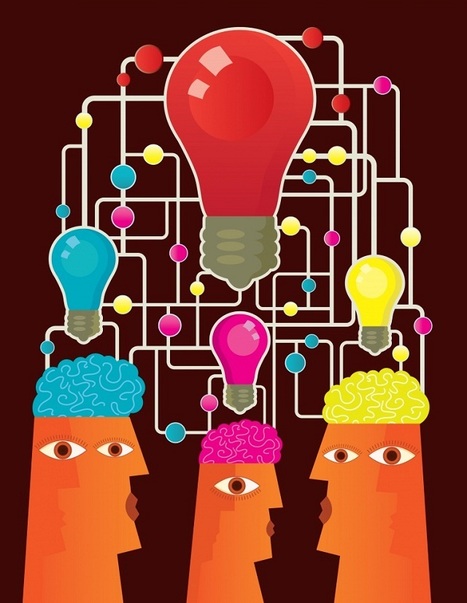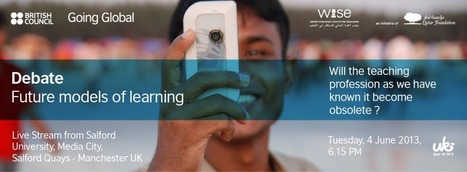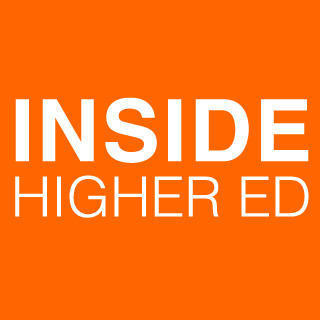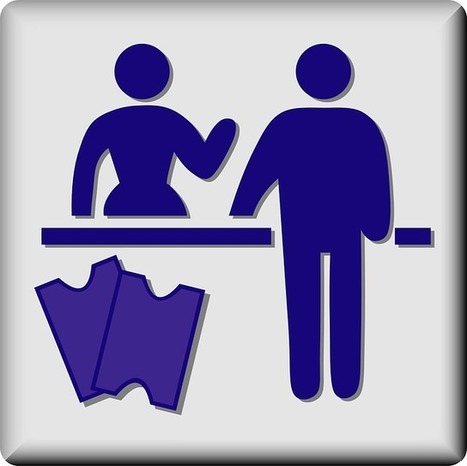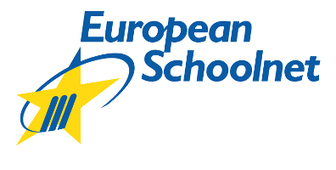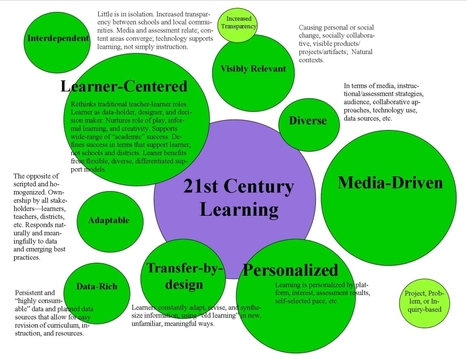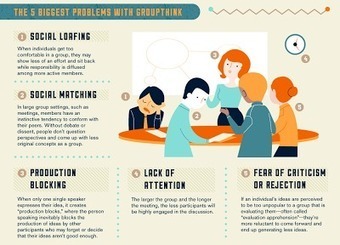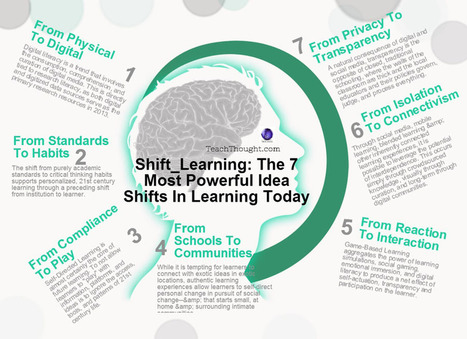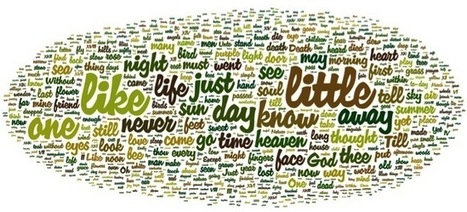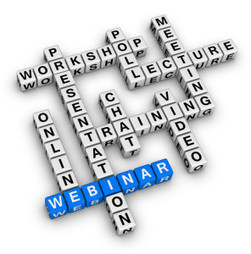50 Education Technology Tools Every Teacher Should Know About - Lists of great technology tools for teachers broken down by category - Learning, Lesson planning, etc
Get Started for FREE
Sign up with Facebook Sign up with X
I don't have a Facebook or a X account

 Your new post is loading... Your new post is loading...
 Your new post is loading... Your new post is loading...
Current selected tag: 'learning'. Clear
Recently, Mark Zuckerberg addressed a large auditorium of young entrepreneurs in Silicon Valley. He shared lessons from his journey and his perspective on the state of the internet industry. Every
Around the world, policymakers and educators have high hopes for ICT in the classroom as a springboard to students’ “21st century skills”—that combination of competencies in solving problems, collaborating, thinking critically, and managing their own learning that we know is needed for success in the global workplace. But again and again, we see a gap between how this type of teaching and learning is described in policy documents and the pedagogy that most students experience. Often, teachers want to teach in these new ways but are missing the supports they most need to make it happen. To address this gap, the 3-year ITL (Innovative Teaching and Learning) Research project was designed to study teaching practices that support students’ learning of 21st century skills and the system of supports that can help teachers to adopt those practices. The research was carried out in a uniquely diverse set of seven countries: Australia, Indonesia, Russia, Finland, Senegal, England, and Mexico. The project was sponsored by Microsoft Partners in Learning and in-country sponsors, with rigorous research methods designed by SRI International and carried out by leading research organizations within each country. While the participating countries have very different education systems and histories of innovation, the research was able to look across them: what do the necessary supports for innovative teaching in Indonesia and Finland have in common?
Plagiarism is a growing problem for universities, many of which are turning to software detection for help in detecting and dealing with it. This paper explores issues around plagiarism and reports on a study of the use of Turnitin in a new university. The purpose of the study was to inform the senior management team about the plagiarism policy and the use of Turnitin. The study found that staff and students largely understood the university’s policy and Turnitin’s place within it, and were very supportive of the use of Turnitin in originality checking. Students who had not used Turnitin were generally keen to do so. The recommendation to the senior management team, which was implemented, was that the use of Turnitin for originality checking should be made compulsory where possible – at the time of the study the use of Turnitin was at the discretion of programme directors. A further aim of the study was to contribute to the sector’s body of knowledge. Prevention of plagiarism through education is a theme identified by Badge and Scott (2009) who conclude an area lacking in research is “investigation of the impact of these tools on staff teaching practices”. Although a number of recent studies have considered educational use of Turnitin they focus on individual programmes or subject areas rather than institutions as a whole and the relationship with policy.
Jamie Nast/Flickr Helping students learn how to learn: That's what most educators strive for, and that's the goal of inquiry learning. That skill transfe
Educators say failure is part of the learning process. So how come schools always expect success the first time around? A land of tiny elves or a world of postapocalyptic robots might not resemble a classroom, but the problem-solving happening in a video game player’s mind often mirrors the same process of tackling a tricky puzzle on a test. But unlike a test, when a player runs out of lives in a game, he or she just heads back to the menu screen, determined to figure it out the next time around.
There is an age old adage that says “two heads are better than one”. Consider collaboration in recent history: Watson and Crick or Page and Brin (Founders of Google). But did you know it was a collaborative Computer Club about basic programming at a middle school that brought together two minds that would change the future of computing? Yes, those two were of course, Bill Gates and Paul Allen, the founders of Microsoft. Collaborative learning teams are said to attain higher level thinking and preserve information for longer times than students working individually. Why is this so? Cited From: http://www.opencolleges.edu.au/informed/features/facilitating-collaborative-learning-20-things-you-need-to-know-from-the-pros/#ixzz2WNfjZ3KJ
First book devoted to the exploration of the dimensions and dynamics of managing eLearning projects. An international collection of 22 case studies from the public and private sectors, across organizational and industry types.
Does new technology conflict with or complement established teaching and learning? What is the impact on the teaching profession as we have traditionally known it? Will the power of the internet, with new innovations such as Massive Open Online Courses (MOOCs), create an unstoppable ‘avalanche’ of education reform, or are these reforms a false revolution? Can the value of face-to-face quality learning and student-teacher relationships ever really be questioned, at any level of education? Will the class room, lecture theatre, and traditional notion of education space – schools and universities – be usurped by a screen, online and distance learning, or alternative spaces such as the workplace, home, or concert-hall? Speakers for the motion: Dale Stephens, Founder of the Uncollege movement that provides resources for students that wish to define their own educational paths, whether in or outside of traditional higher education models Professor Sugata Mitra, Educational researcher, Newcastle professor and TED talk winner most famous for his 'Hole in the Wall' and 'Self Organised Learning Environment (SOLE)' experiments Daniel Stevens, NUS International Students Officer Speakers against the motion: Professor Martin Hall, Vice-Chancellor, Salford University Pamela Wright OBE, Executive Headteacher, Wade Deacon High School (2012 TES Outstanding Secondary School of the Year) Bilal Shakir, WISE Learners’ Voice Via Nik Peachey 
Ricard Garcia's curator insight,
June 12, 2013 5:21 AM
Food for thought! I think we can't underestimate these new trends breaking into our classrooms... at least in order to be able to see if they will definitely come here to stay. 
Kim Flintoff's curator insight,
June 18, 2013 9:48 PM
The discussion is more than a hour so make sure you're comfortable before you start viewing. 
Pamela Bartar's curator insight,
July 5, 2013 4:27 AM
expert knowledge for everybody - remembers me on the recent past of creativity and makes me think on Berlin.....
Joyce Seitzinger is an education technologist working in higher education, passionate about improving learning experiences through emerging technologies and ...
As widely reported, five massive open online courses have been deemed worthy of an academic credit recommendationby the American Council on Education. The announcement by ACE has been greeted with equal parts acclaim and concern. Many see this step as a new day for increased access and reduced cost for those working toward a degree. Content costing thousands of dollars on campus may now be available for free and in the comfort of one’s own home. Others, especially in academe, continue to express concern about the nature of MOOCs and their ability to produce learning.
There are a number of useful teaching and learning resources online. This page contains links to those resources organized by topic. |
I have written a lot about how knowledge workers are using the Social Web to organise their own learning and performance support and how this is changing the face of workplace learning such that th...
see also: http://learningconcierge.co.uk/society/
"It seems that the days of the Socratic teacher are fast fading. The digital world gives everyone an opportunity to find his or her own expert, not necessarily in the classroom. The Internet and other digital resources provide students and teachers with the means to reach out to the world and extract the information that they find most interesting, whatever it may be." Via Dr. Susan Bainbridge
From
www
More than 100 teachers from across Europe participated in the SMILE (Social Media in Learning and Education) action and undertook a pedagogical journey to explore jointly the challenges and opportunities involved when using social media in learning and education.
The outcomes of the project, funded by a Digital Citizenship Research Grant from Facebook, are now published in a digital handbook. You can find pedagogical materials and resources from the learning laboratory with many valuable reflections and suggestions on some critical aspects of the use of social media as regards school policies, pedagogical principles, professional development, responsible use and challenges to adoption.
9 Characteristics Of 21st Century Learning
The label of “21st Century learning” is vague, and is an idea that we here at TeachThought like to take a swing at as often as possible, including: –weighing the magic of technology with its incredible cost and complexity –underscoring the potential for well thought-out instructional design –considering the considerable potential of social media platforms against its apparent divergence from academic learning Some educators seek out the ideal of a 21st century learning environment constantly, while others prefer that we lose the phrase altogether, insisting that learning hasn’t changed, and good learning looks the same whether it’s the 12th or 21st century.
Innovative design crosses over all aspects of education. The American Society for Innovation Design in Education, or ASIDE, seeks to infuse curriculum with new approaches to teaching and thinking.
Today I am sharing with you a great graphic realized by Terry Heick in which he featured the 7 most powerful idea shift in today's learning. I find this work clicks with the purpose of the posts I mentioned above . It is true that the work is subjective but at least it captures the essence of the transformational change that has befell education in the 21st century . Check it out below and share with us what you think of it.
The point of any pedagogy is not the length of the course, size of the classroom, the headcount, or the completion or attrition rates. Pedagogy is unfazed by numbers; it is never outweighed by scale. Good pedagogy can be enacted in a room with one or two students, or in an online environment with thousands. This is because pedagogy is responsive, able to grow to the space it must inhabit, and its goal is a shift in thinking, which is spreadable by a single learner or by ten or by tens of hundreds. - See more at: http://www.hybridpedagogy.com/Journal/files/Pedagogies_of_Scale.html#sthash.Bk0cdnPQ.dpuf
"We will only profit from these new approaches if we see them (and their failures) as a direct charge to investigate pedagogies of scale, the responsibilities of those who participate in learning-at-scale (teachers, facilitators, course designers, students, technologists), and the shifting hierarchies of social learning. Ultimately, every course must outgrow its container."
The Book of Abstracts of the 2007-2012 European Distance and ELearning Network (EDEN) Annual Conferences and formerly published papers presented at earlier Annual Conferences, Research Workshops and Open Classroom Conferences can be downloaded hereunder.
People interested in Massive Open Online Courses will probably be aware of the research by Helene Fournier and me on Personal Learning Environments and MOOCs. We carried out research in the MOOC PLENK2010 (The MOOC Personal Learning Environments Networks and Knowledge that was held in the fall of 2010). The data collected on this distributed course with 1641 participants has been massive as well. Its analysis has kept us and some fellow researchers busy over the past year. The research has resulted in a number of publications and I thought it might be useful to post links to all of our journal articles, conference papers and presentations that were published in relation to PLEs and MOOCs in one space. Each publication looks at the data from a different perspective, eg, requirements in a PLE, self-directed learning, learner support, creativity.
From
www
Research on learners has shown that adults learn differently from younger students. Adults have special needs as learners and these needs should
This document provides a summary of research associated with assessment for learning. It reviews and evaluates the evidence emerging from empirical research and also the work of schools in recent years.
Wondering if you should include webinars/teleseminars in your learning mix? Here is a look at the pros and cons of them as a learning method. (When is a Webinar a Good Learning Option? |








